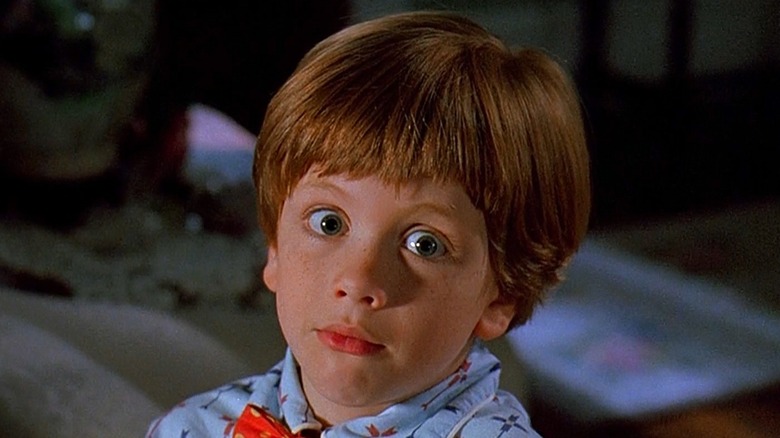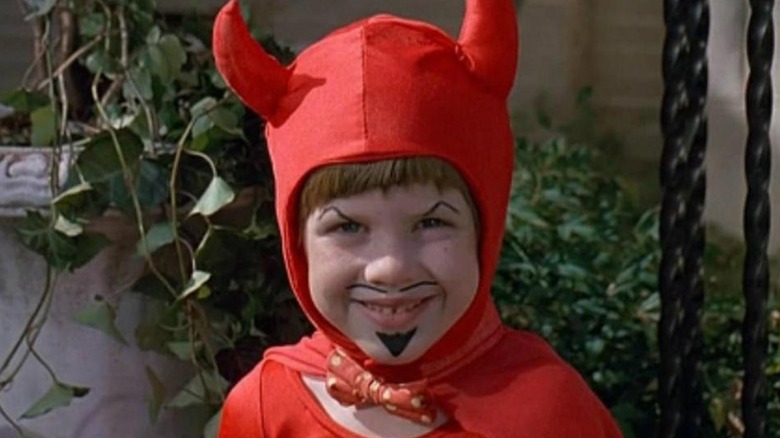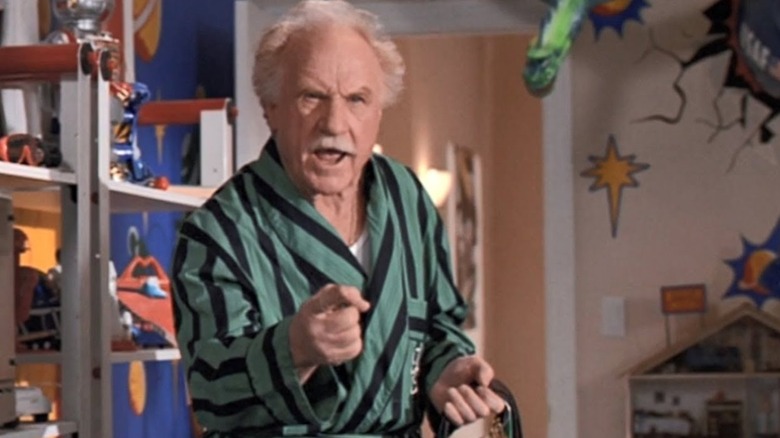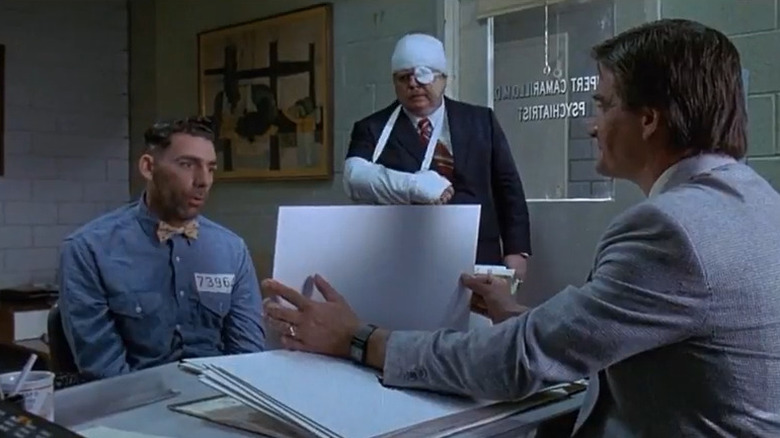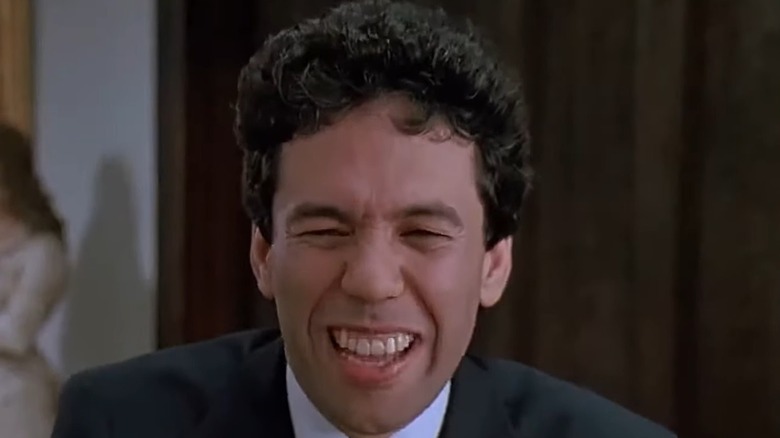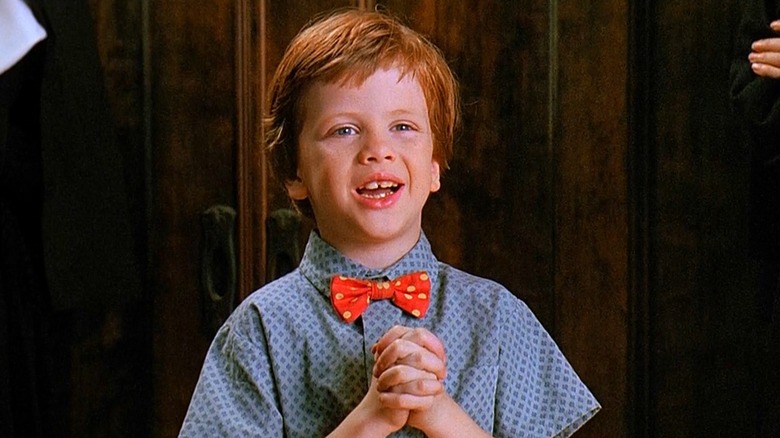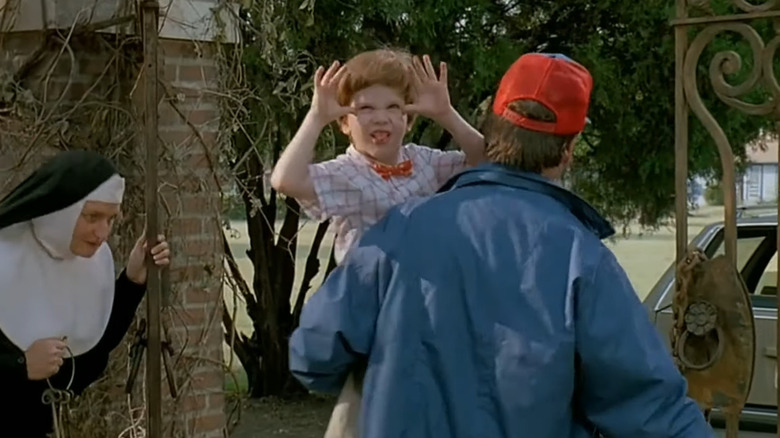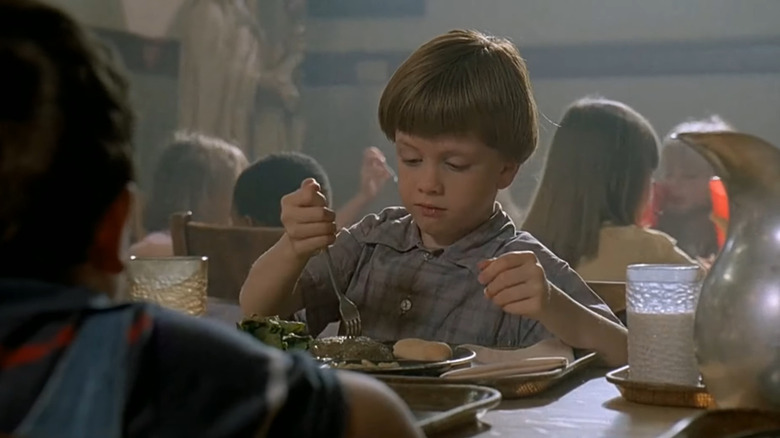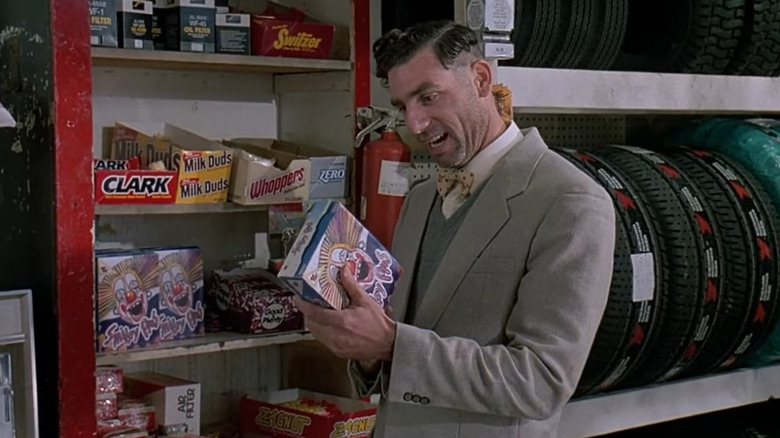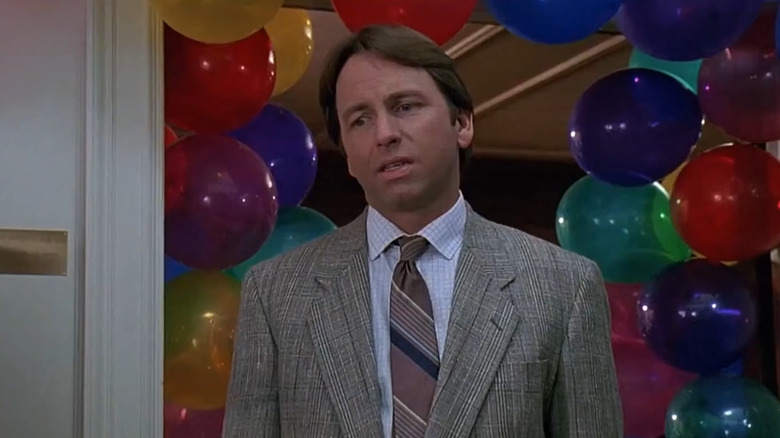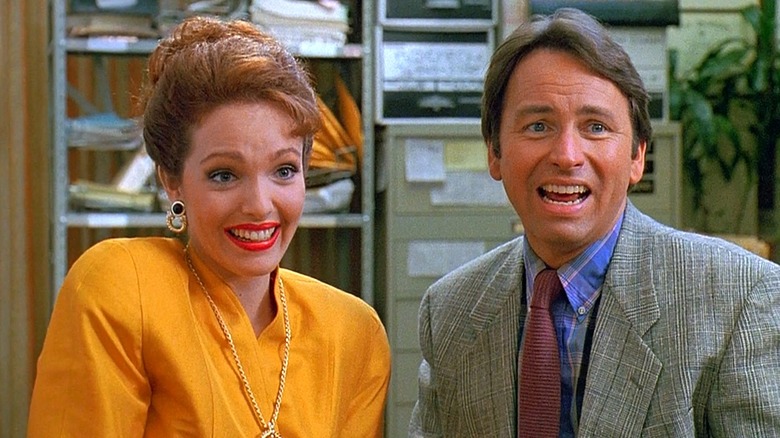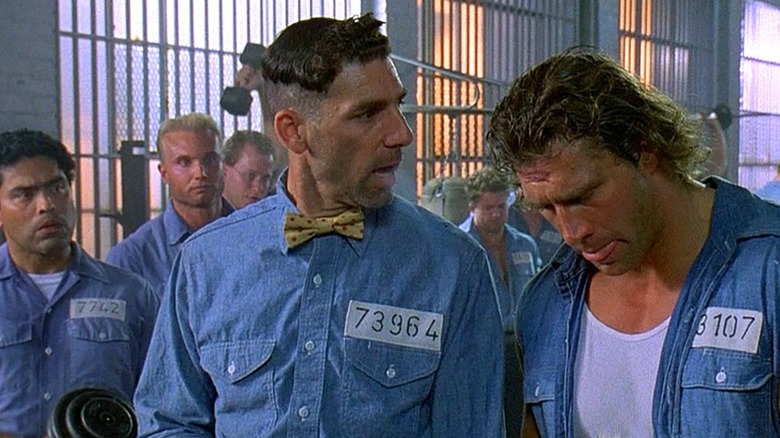Things Only Adults Notice In Problem Child
Before director Dennis Dugan teamed up with Adam Sandler for the likes of "Happy Gilmore" and "Big Daddy," he cut his teeth in the business by directing 1990's "Problem Child." Starring Michael Oliver as the cute-as-a-button-but-hellish Junior and John Ritter as his good-natured adoptive father, Ben Healy, the comedy was a surprise hit for its time. Much like Dugan's other work, the movie was never likely to win any major awards or feature in best-of-all-time lists, but it found its audience with its outlandish gags and continues to be widely discussed three decades after its release.
Looking at "Problem Child" through older eyes, though, it's a much different film than before. There are certain filmmaking decisions and peculiar storyline threads that never appeared as clearly as they do now. From Junior secretly being the son of the Devil to the movie being based on a shocking true story, let's take a look at things only adults notice in "Problem Child."
Problem Child is basically an Omen sequel
Throughout "Problem Child," Junior was painted as wildly misunderstood. All he needed was a little bit of love and he'd be back on track as a kind and caring child. But no ... This kid was the Devil incarnate, because all he knew was pure evil. While some of his pranks appeared like toilet humor or innocently immature, there were others that were severely dangerous and aimed to maim.
Remember Richard Donner's "The Omen" with Damien Thorn? He made "accidents" happen around him, including people falling down the stairs and serious car crashes. Sounds an awful lot like the tricks out of Junior's repertoire, right? In all likelihood, Junior was probably Damien under a different guise, since he'd wrecked so much havoc that he had to change his identity. Also, which young boy wants to become pen pals with a convicted criminal? Simply put: Junior didn't need love to become a better human being; he needed an exorcism.
Big Ben doesn't owe his business to his son
Big Ben (Jack Warden) was a minor antagonist in "Problem Child." He was boisterous, pompous, and belittled his son, Ben. Big Ben also owned a successful sports apparel business and planned to run for town mayor. Even though Ben had worked for his father for a decade, he wasn't in the consideration to take over the family business as Big Ben decided to sell it to a foreign company. Naturally, Ben was upset, since he thought he would be next in line when his father stepped down.
While Ben's anger was understandable, Big Ben didn't do anything wrong here. After all, it was his business, which he built from the ground up and he should have a say in what he does with it. At one point, Big Ben told his son that he's "too nice" to run a business, and it was a radical honesty. Ben needed to learn how to stick up for himself and be more assertive, which he eventually achieved at the end of the film. That said, his father didn't owe him his business to begin with.
Why does the Bow-Tie Killer wear his bow tie in prison?
Going to prison isn't a holiday by any means. Inmates have all their personal belongings are taken from them, and are often rigorously searched to make sure they aren't carrying any contraband. So then how was it possible for Martin Beck (Michael Richards), aka the Bow-Tie Killer, to walk around in his prison uniform and still have his bow tie on?
In "Problem Child," it's shown that the prison guards are afraid of Beck, allowing him to rule the prison as if it were his own playground. That still doesn't explain how he was allowed to keep his bow tie, even if it was something that a lawyer could have negotiated on his behalf. Additionally, it looked ridiculous and didn't complement his prison attire. While the reason for him wearing it in prison was likely done for comedic effect, one has to wonder if the Chainsaw Killer would be allowed the same exception for his signature piece.
Mr. Peabody is a terrible social worker
Undoubtedly, Mr. Peabody is fondly remembered by "Problem Child" fans, since it was many people's introduction to the late Gilbert Gottfried. While Gottfried's mannerisms and shrill voice added some spice to the character, Mr. Peabody was actually horrible at his job and deserved to be fired for sheer incompetence.
As an adoption agent for the orphanage, Mr. Peabody's sole purpose was to ensure that every child had an equal chance to be adopted. Junior was a challenging prospect due to his past behavior and history of trouble, and Mr. Peabody couldn't wait to get rid of him at all costs. That said, a social worker with that attitude towards a child is a problem, since they're supposed to demonstrate the important traits of compassion and empathy. Make no mistake about it, Junior was a horrid little boy, but part of Mr. Peabody's job was to deal with children on a daily basis — and that comes with a fundamental understanding of the good and bad sides of the adoption processes.
Problem Child is one of the worst rated films on Rotten Tomatoes
Mention "Problem Child" to someone who grew up in the '90s and they're likely to remember the film's child star or recall one of its funnier scenes. While it was never as celebrated as other child-centric comedies such as "Home Alone" or "The Parent Trap" remake, it certainly has its fans. Plus, it was a success at the box office, too, raking in over $72 million (via Box Office Mojo).
Considering the lowbrow humor, it should come as no surprise that it wasn't warmly received by the critics. However, most people aren't aware of how it was critically mauled, sitting with a rare 0% approval on Rotten Tomatoes. Variety's review of the film didn't hold back, either, stating: "Universal took a step in the right direction by whittling 'Problem Child' down to just 81 minutes but didn't go far enough. The studio should have excised another 75 minutes and released this unbelievable mess as a short." Despite the stinging backlash, Junior had the last laugh, as he received two sequels and a short-lived animated TV show.
What happened to Junior's previous adopted parents?
Judging by what Junior did to Ben and Flo (Amy Yasbeck), there was no doubt that he was a troublemaker. Yet, here's the surprising part: Junior seemed to like Ben, so we have to wonder if he held back when he misbehaved. This leads us to another interesting chain of thought: Just how badly did he treat his previous adopted parents?
As revealed by Mr. Peabody, Junior was returned 30 times to the orphanage after being adopted. That's a phenomenal number of times, even more so for a seven-year-old boy. Now, not all people would have demonstrated the patience that Ben did with Junior, but it's difficult to imagine that all 30 parents lacked the empathy to deal with this child. He must have done some really despicable things to get sent back to the orphanage. In fact, has anyone checked up on them to see if any of the families are still around? It's worth considering, especially with Junior's affinity towards the dark side.
Every song tells you that Junior is bad
Foreshadowing is a powerful tool in film. For some directors, they'll include Easter eggs that hint at future events, while others will utilize throwaway lines that reveal more about the characters and plot than we initially imagine. In "Problem Child," director Dennis Dugan's song choices all but confirmed to us who Junior was at his core. And no, they weren't the kind of tracks that had a double meaning; they were as on the nose as they come.
From "Born to Be Wild" to "Bad to the Bone," these songs left nothing to the imagination. They were effectively character studies of who Junior was and what he was all about. At the same time, they're also crowd-pleasing tracks that most people are familiar with and don't find too offensive. It's highly improbable that Dugan would have selected Diamond Head's "Am I Evil?" or Mötley Crüe's "Shout at the Devil" for this soundtrack, even though they're both appropriate for Junior as well.
There's no way the Bow-Tie Killer could know Junior's address
The correspondence between Martin Beck and Junior at the orphanage checks out — if Junior sent him mail, the Bow-Tie Killer would easily know who and where to reply to. However, an inconsistency popped up before the Healys adopted Junior. At this point in the timeline, Junior didn't know he was about to be adopted or where the Healys lived, since the adoption process was taking place in the background. In a scene before the Healys officially adopted the boy, Junior wrote a letter to Beck, telling him that he was on the move and leaving his current location.
How exactly did Junior know this detail? Also, there was no way he'd know the Healys' address yet to pass it on to Beck. There's a good chance that this was simply a plot hole or as a result of another scene being cut that would tie up this loose end. Nonetheless, it created a big logic gap in how Beck and Junior communicated with one another from there on.
A prune would not stop a bullet
The whole concept of Ben handing Junior a prune that his grandfather gave to him as a symbolic gesture of trust is sweet, though one does wonder why a prune was chosen over a multitude of other items to begin with. More importantly, it worked as a setup to save Ben from being killed, as the prune stops the bullet from entering his chest when the Bow-Tie Killer shoots him. Again, a touching moment, but one that had most scientists shaking their heads in disbelief.
According to Popular Mechanics, a bullet pierces through many household items such as a couch or an iron skillet. If a skillet can't stop a bullet, will a prune make much of a difference? Sure, a prune can get incredibly hard and tough to crack if it's left to stand for a long time, but the chances of it being able to stop a bullet are next to none.
Problem Child is based on a true story
We have all encountered a problem child or two in our lives. However, even Junior's behavior in the film seemed too extreme and exaggerated. Adopted children may require some adjustment time, but it's unlikely that they would behave in the same out-of-control way as Junior did. As it turns out, the story of "Problem Child" might actually be toned down, since it was based on a true-life horror adoption story.
The film's writers Scott Alexander and Larry Karaszewski confirmed on Gilbert Gottfried's Amazing Colossal podcast that the inspiration for the story came from a 1988 Los Angeles Times article titled "An Adopted Boy — and Terror Begins." According to the report, Tom and Janice Colella sued an adoption agency for failing to inform them of the issues of their eight-year-old adopted son, Tommy. The boy had violent urges and created a litany of trouble for the couple. The couple was informed that he had a planned to murder them and their newborn infant at one point. While other writers tried to pitch this true story as a horror to Hollywood, Alexander and Karaszewski decided it would work best as a dark comedy.
A prisoner's mail is checked
As mentioned before, there were a few discrepancies in how Martin Beck and Junior communicated — specifically to do with the timeline of events. However, there was a bigger issue here; namely, how not a single guard checked Beck's mail. By law, a prison is allowed to go through an inmate's mail before delivering it to them. As seen in "Problem Child," the fearful guards delivered Junior's letters to Beck, but wouldn't it make sense for them to read the mail before handing it to such a dangerous criminal?
When Beck escaped, the prison could have gone through the mail he received and checked the addresses of the people who corresponded with him. This would have potentially helped them to identify his next location. Unfortunately, these law enforcement officials appeared to be of the same caliber and school of thought as the Gotham City Police Department, where everything's made up and the logic doesn't matter.
Junior lied to Ben at the end of the film
When Junior believed Ben was dying, he made a promise to him. He said that if Ben survived, he would be good from that moment forward. All the shenanigans and bad behaviors would be in the past. Ben survived and Junior was ecstatic to see his father would live. However, his promise proved to be no good, as Junior went back to being an agent of chaos and received two sequels to boot that weren't exactly titled "Reformed Child."
Of course, there's a case to be made that Junior was just a child and it was an innocent prayer when he thought he would lose his father. It's worth adding that Junior probably felt responsible for Ben being shot in the first place. With that said, he didn't even try to be good for a short period of time, now did he? As soon as Ben was on his feet, he went back to being a problem child.
